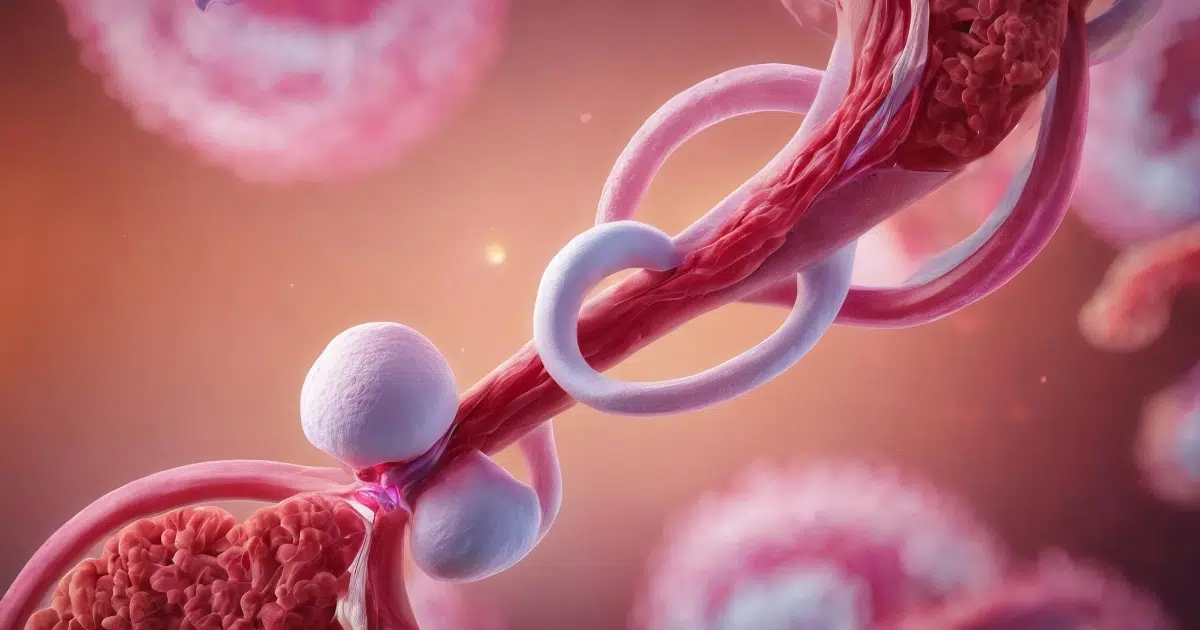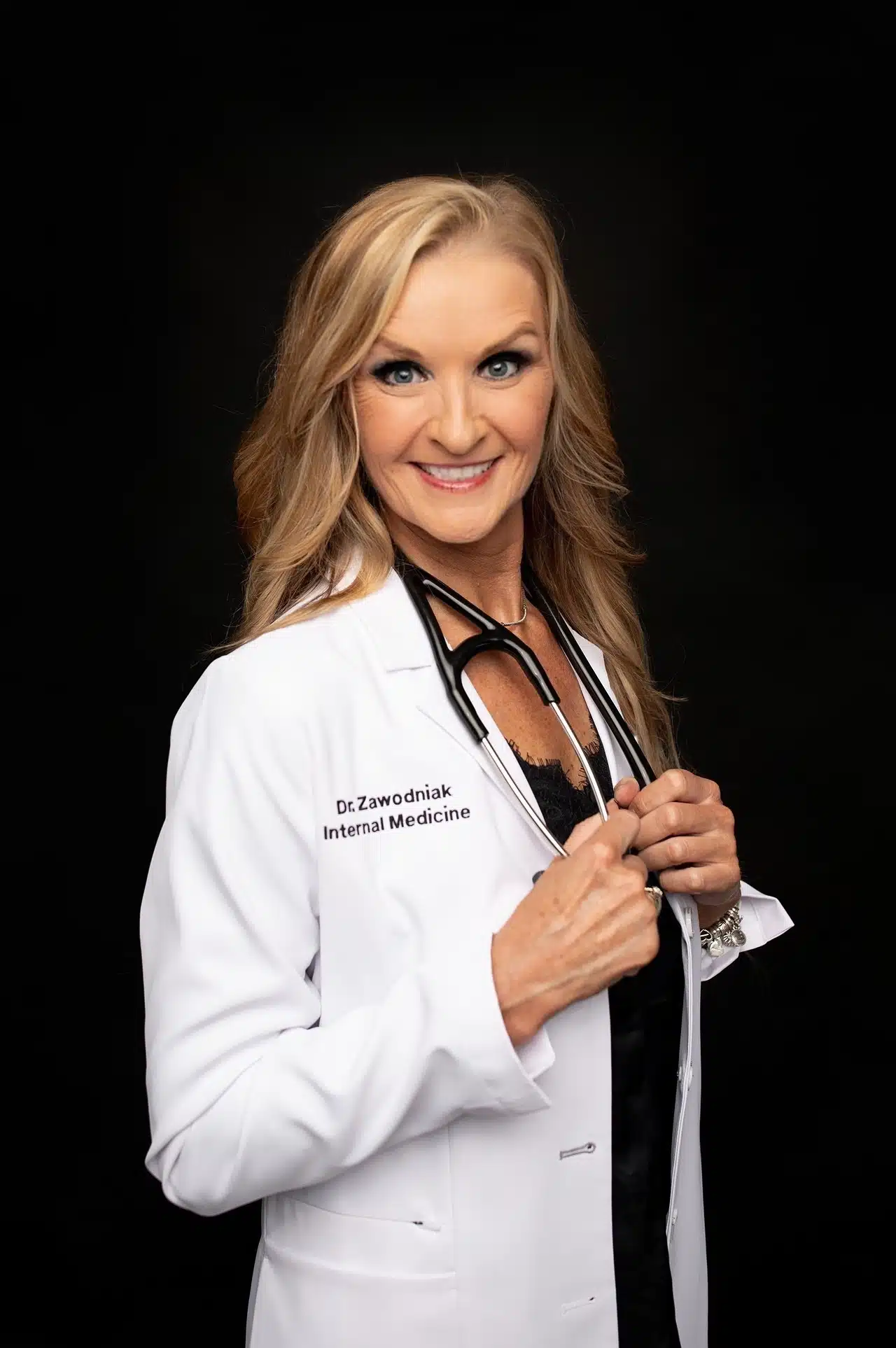The Hormone Replacement Decision That Changes Everything
Standing in your doctor’s office, you’ve just been told that hormone replacement therapy could help with your fatigue, mood swings, and declining vitality. But then comes the question that stops you in your tracks: “Do you want bioidentical or synthetic hormones?”
If you’re like most patients in Brevard County, this decision feels overwhelming. You want what’s safest and most effective, but understanding the difference between bioidentical and synthetic hormones can be complex. Should you choose bioidentical hormone therapy that uses hormones identical to those your body produces naturally, or trust synthetic hormone therapy that has been used for decades in traditional hormone treatments?
At AZ Health Solutions, Dr. Ashley Zawodniak understands this dilemma. As a board-certified internal medicine physician specializing in hormone optimization, she’s helped hundreds of patients navigate this critical choice between bioidentical and synthetic hormones. The truth is, the choice between these hormone types isn’t just about chemistry – it’s about finding the safest, most effective path to reclaiming your energy, mood, and vitality through personalized hormone replacement therapy.
What Makes Hormones “Bioidentical” or “Synthetic”
Understanding Bioidentical Hormones
Bioidentical hormones are compounds that have the exact same molecular structure as the hormones your body produces naturally. These natural hormones are derived from plant sources – primarily soy and wild yam – and are then processed in laboratories to match human hormones precisely. The key distinction is that bioidentical hormones are structurally identical to those produced by the human body.
Key characteristics of bioidentical hormone therapy:
- Molecular structure identical to human hormones
- Derived from plant sources (phytoestrogens)
- Metabolized by the body the same way as natural hormones
- Available in multiple delivery methods through compounding pharmacies
- Often custom-compounded for individual hormone needs
- May offer safer and more effective treatment options
Understanding Synthetic Hormones
Synthetic hormones are laboratory-created compounds that have similar effects to human hormones but different molecular structures. These hormones used in traditional hormone replacement therapy include conjugated equine estrogen (derived from pregnant horse urine) and synthetic progestins like medroxyprogesterone acetate.
Key characteristics of synthetic hormone therapy:
- Molecular structure differs from human hormones
- Created entirely in laboratories using chemical synthesis
- Metabolized differently than naturally occurring hormones
- Standardized dosing and formulations through FDA-approved hormone therapies
- Widely studied in large clinical trials
- Used in traditional hormone treatments for decades
The choice between bioidentical or synthetic hormones often comes down to whether you prefer hormones that are chemically identical to the hormones your body naturally produces, or synthetic hormone options that have extensive research backing but may increase the risk of certain side effects.
The Science Behind Hormone Production
Bioidentical Hormone Manufacturing
The creation of bioidentical hormones begins with plant precursors, particularly diosgenin from wild yam and beta-sitosterol from soy. Through a series of chemical modifications in FDA-regulated laboratories, these plant compounds are converted into hormones that are structurally identical to those produced by human ovaries, testes, and adrenal glands.
The bioidentical hormone process:
- Plant extraction – Hormonal precursors isolated from plants
- Laboratory conversion – Chemical processes create identical molecular structures
- Purification – Removal of impurities and standardization of potency
- Formulation – Creation of creams, pellets, or other delivery methods
- Quality testing – Verification of purity and potency
Many bioidentical hormones are made through compounding pharmacies, which can tailor hormone combinations and dosages to individual patient needs. However, some FDA-approved bioidentical hormone preparations are also available, including estradiol patches and progesterone capsules.
Synthetic Hormone Manufacturing
Synthetic hormones are created through entirely artificial chemical processes. For example, Premarin (conjugated equine estrogens) is derived from pregnant mare urine, while synthetic progestins are created through complex chemical synthesis that results in hormones that are not identical to hormones produced by the human body.
The synthetic hormone process:
- Chemical synthesis – Creation of hormone-like molecules in laboratories
- Standardization – Mass production with consistent formulations
- FDA approval – Extensive clinical trials for safety and effectiveness
- Commercial production – Large-scale manufacturing for distribution
- Quality control – Standardized testing protocols
The advantage of synthetic hormone therapy is that these hormone treatments have undergone rigorous FDA testing for safety and effectiveness, providing extensive data on their risks and benefits.
What the Research Shows
Bioidentical Hormone Safety Profile
Research suggests that bioidentical hormones may offer certain safety advantages due to their identical molecular structure to human hormones. Studies indicate that bioidentical hormones are safer than some synthetic alternatives, particularly when it comes to cardiovascular and breast cancer risks.
Potential safety advantages of bioidentical hormone therapy:
- More predictable metabolism pathways since they’re identical to hormones naturally produced
- Lower risk of blood clots compared to synthetic estrogen
- Reduced breast cancer risk compared to synthetic progestins
- Better cardiovascular risk profile in some studies
- Fewer side effects reported by patients taking bioidentical hormones
- Natural hormones may be better tolerated by the body
Important safety considerations:
- Limited large-scale, long-term studies compared to synthetic options
- Compounding pharmacies quality varies, affecting safety of compounded bioidentical hormones
- Individual response can vary significantly with any hormone treatment
- Still carry hormone therapy risks similar to other hormone therapies
- Require proper monitoring and dosing for optimal safety
Synthetic Hormone Safety Profile
Synthetic hormones have been extensively studied through large clinical trials, providing substantial safety data. However, certain synthetic formulations have been associated with increased health risks, particularly highlighted by the Women’s Health Initiative study.
Well-documented safety data for synthetic hormone therapy:
- Decades of clinical research available on traditional hormone replacement therapy
- Standardized manufacturing ensures consistency in FDA-approved hormone therapies
- Clear guidelines for safe prescribing established through extensive research
- Established protocols for monitoring patients using synthetic hormones
- Known risk profiles for various synthetic hormone combinations
Known safety concerns with synthetic hormones:
- Increased blood clot risk with oral synthetic estrogens
- Higher breast cancer risk with synthetic progestins
- Cardiovascular risks in certain populations, particularly older women
- More side effects reported compared to bioidentical options
- May increase the risk of stroke and heart disease in some patients
- Metabolic disruptions in some patients taking synthetic hormones
The safety of compounded bioidentical hormones versus FDA-approved synthetic options remains an area of ongoing research, with medical professionals continuing to evaluate the risks and benefits of each approach to hormone replacement therapy.
Clinical Outcomes and Patient Experiences
Bioidentical Hormone Effectiveness
Patient reports and clinical observations suggest that bioidentical hormone therapy may provide more natural symptom relief with fewer side effects. Dr. Zawodniak’s experience at AZ Health Solutions confirms these findings, with many patients reporting superior results with bioidentical hormone replacement therapy.
Reported benefits of bioidentical hormone therapy:
- More natural feeling symptom relief that mimics the body’s own hormone production
- Better mood stability and mental clarity compared to synthetic alternatives
- Improved energy levels without the crashes associated with some synthetic hormones
- Enhanced sleep quality and reduced night sweats
- Better weight management and metabolic function
- Reduced side effects compared to synthetic hormone options
- Improved libido and sexual function in both men and women
Clinical considerations for bioidentical hormones:
- Individual dosing allows for optimization based on hormone levels in saliva or blood
- Multiple delivery methods for better absorption and patient preference
- Ability to adjust ratios of different hormones for personalized treatment
- Custom formulations for unique hormone needs through compounding pharmacies
- Regular monitoring enables fine-tuning of hormone treatment protocols
Synthetic Hormone Effectiveness
Synthetic hormones have proven effective for treating menopausal symptoms and hormone deficiencies, with extensive clinical trial data supporting their use in traditional hormone replacement therapy.
Documented benefits of synthetic hormone therapy:
- Proven reduction in hot flashes and night sweats in menopausal women
- Effective for preventing osteoporosis and maintaining bone density
- Standardized dosing for predictable results in hormone treatment
- Insurance coverage often available for FDA-approved hormone therapies
- Well-established treatment protocols based on decades of research
- Extensive safety and effectiveness data from large clinical studies
Clinical limitations of synthetic hormone therapy:
- One-size-fits-all approach may not suit everyone’s hormone needs
- Limited flexibility in dosing and hormone combinations
- Higher incidence of side effects compared to bioidentical alternatives
- May not address all symptoms effectively for some patients
- Less individualized treatment options compared to compounded bioidentical hormones
- Potential for hormones to be metabolized differently than natural hormones
Who Benefits Most from Each Type of Hormone Therapy?
Ideal Candidates for Bioidentical Hormone Therapy
Based on Dr. Zawodniak’s clinical experience with hormone optimization, certain patients tend to respond better to bioidentical hormone replacement therapy:
Women who may benefit most from bioidentical hormones:
- Those seeking more natural treatment approaches for menopause or hormone imbalance
- Patients with sensitivity to synthetic medications or previous adverse reactions
- Women wanting customized hormone ratios tailored to their specific needs
- Those prioritizing fewer side effects and more natural hormone replacement
- Patients interested in comprehensive hormone optimization rather than symptom management
- Women experiencing perimenopause who want hormones identical to those they naturally produce
Men who may benefit most from bioidentical hormone therapy:
- Those seeking natural testosterone optimization and hormone balancing
- Patients wanting steady hormone levels without the peaks and valleys of some treatments
- Men interested in comprehensive wellness approaches to hormone health
- Those with sensitivity to synthetic medications or previous treatment failures
- Patients prioritizing long-term health optimization through natural hormones
- Men experiencing andropause who prefer bioidentical testosterone therapy
Ideal Candidates for Synthetic Hormone Therapy
Synthetic hormones may be appropriate for certain patients and clinical situations:
Patients who may benefit from synthetic hormone therapy:
- Those requiring standardized, FDA-approved hormone treatments with extensive research
- Patients with insurance coverage requirements that favor traditional hormone therapy
- Women needing well-studied treatment protocols for specific medical conditions
- Those preferring conventional medical approaches with established safety profiles
- Patients with specific medical conditions requiring proven hormone treatments
- Individuals who have successfully used synthetic hormones in the past
Dr. Zawodniak’s Approach: Why AZ Health Solutions Specializes in Bioidentical Hormone Therapy
The Clinical Reasoning Behind Bioidentical Hormone Preference
Dr. Ashley Zawodniak’s decision to specialize in bioidentical hormone therapy stems from her comprehensive medical background and patient-centered philosophy. Her unique combination of nursing experience and medical expertise provides a holistic perspective on hormone optimization that prioritizes patient safety and effectiveness.
Why bioidentical hormone therapy aligns with our practice values:
Patient-Centered Care – Bioidentical hormone therapy allows for individualized treatment plans that address each patient’s unique symptoms and hormone levels, whether they’re dealing with menopause, andropause, or other hormonal imbalances.
Evidence-Based Practice – While respecting the extensive research on synthetic hormone therapy, Dr. Zawodniak integrates emerging evidence supporting bioidentical hormone safety and effectiveness, particularly regarding reduced cardiovascular and cancer risks.
Comprehensive Wellness – Bioidentical hormone replacement therapy aligns with our preventive medicine approach, focusing on optimization rather than just symptom management, addressing the whole person rather than isolated symptoms.
Accessibility and Comfort – Through our Direct Primary Care model, patients receive the time and attention needed for proper hormone optimization without insurance barriers or rushed appointments.
Our Bioidentical Hormone Expertise and Treatment Options
As an EvexiPEL certified provider, Dr. Zawodniak offers advanced bioidentical hormone pellet therapy alongside other delivery methods, ensuring patients receive hormones that are structurally identical to those their bodies naturally produce:
Available bioidentical hormone treatment options:
- EvexiPEL hormone pellet therapy for consistent hormone delivery
- Custom-compounded creams and gels from specialized compounding pharmacies
- Bioidentical hormone injections for precise dosing control
- Sublingual tablets and troches for easy administration
- Combination therapy approaches using multiple bioidentical hormones
Our comprehensive approach to hormone optimization includes:
- Detailed hormone testing and analysis to determine current hormone levels
- Personalized treatment plan development using bioidentical hormones
- Multiple delivery method options to suit individual preferences
- Ongoing monitoring and optimization to maintain ideal hormone levels
- Integration with overall wellness plans including nutrition and lifestyle factors
Making the Right Choice for Brevard County Patients
Factors to Consider in Your Hormone Therapy Decision
When choosing between bioidentical and synthetic hormones, several factors should guide your decision about which type of hormone replacement therapy is right for you:
Medical History Considerations:
- Previous reactions to hormone therapy or synthetic medications
- Family history of hormone-sensitive cancers or cardiovascular disease
- Current medications and potential interactions with different hormone types
- Existing health conditions that may influence hormone choice
- Personal risk factors for blood clots, stroke, or heart disease
Lifestyle Factors:
- Preference for natural vs. conventional hormone treatments
- Ability to commit to regular monitoring required for hormone optimization
- Budget considerations and insurance coverage for different hormone therapies
- Comfort with compounded medications versus FDA-approved options
- Desired level of treatment customization and individualized dosing
Treatment Goals:
- Symptom relief priorities (hot flashes, mood, energy, libido)
- Long-term health optimization goals beyond symptom management
- Quality of life expectations and timeline for improvement
- Risk tolerance levels for different types of hormone therapy
- Interest in preventive health benefits versus immediate symptom relief
The AZ Health Solutions Decision Framework
Dr. Zawodniak uses a systematic approach to help patients make informed decisions about bioidentical vs synthetic hormones:
Step 1: Comprehensive Assessment
- Complete medical history review including previous hormone therapy experiences
- Current symptom evaluation and impact on quality of life
- Lifestyle and preference discussion about natural vs synthetic approaches
- Risk factor analysis for cardiovascular disease and breast cancer
- Goal setting and expectation management for hormone treatment outcomes
Step 2: Education and Discussion
- Explanation of both bioidentical and synthetic hormone options
- Review of relevant research and safety data for each hormone type
- Discussion of potential benefits and risks of different hormone therapies
- Consideration of individual factors affecting hormone choice
- Addressing questions and concerns about hormone replacement therapy
Step 3: Collaborative Decision Making
- Patient preference integration into treatment planning
- Medical recommendation based on comprehensive assessment
- Treatment plan development using chosen hormone type
- Monitoring protocol establishment for ongoing hormone optimization
- Follow-up scheduling to assess treatment effectiveness
What Research Shows About Bioidentical vs Synthetic Hormones
Key Clinical Studies and Findings
While large-scale studies on bioidentical hormones are still emerging, several important research findings guide clinical practice in hormone replacement therapy:
The Women’s Health Initiative (WHI) Impact:
The landmark WHI study raised significant concerns about synthetic hormone therapy, particularly the combination of conjugated equine estrogens and synthetic progestins. This study highlighted increased risks of breast cancer, blood clots, and stroke with certain synthetic formulations, leading many patients and providers to explore bioidentical alternatives.
Bioidentical Hormone Research:
- Studies suggest lower breast cancer risk with bioidentical progesterone compared to synthetic progestins
- Research indicates reduced blood clot risk with transdermal bioidentical estradiol compared to oral synthetic estrogens
- Clinical observations report fewer side effects and better patient satisfaction with bioidentical hormone therapy
- Some studies show that bioidentical hormones may be safer than synthetic alternatives for cardiovascular health
Ongoing Research Areas:
- Long-term cardiovascular effects of bioidentical hormone therapy compared to synthetic options
- Optimal dosing and delivery methods for different types of bioidentical hormones
- Comparison studies between bioidentical and synthetic hormone formulations
- Safety profiles of compounded bioidentical hormones versus FDA-approved bioidentical preparations
- Effectiveness of bioidentical hormone therapy in different patient populations
Clinical Practice Guidelines for Hormone Therapy
Medical organizations continue to evaluate and update guidelines for hormone replacement therapy, considering both bioidentical and synthetic options:
Current recommendations emphasize:
- Individualized treatment approaches based on patient risk factors and preferences
- Lowest effective dose for shortest duration necessary to achieve treatment goals
- Regular monitoring and reassessment of hormone therapy effectiveness and safety
- Consideration of patient preferences regarding bioidentical vs synthetic hormones
- Shared decision-making between patient and provider about hormone treatment options
Getting Started with Hormone Optimization
The AZ Health Solutions Consultation Process
If you’re considering hormone replacement therapy, whether bioidentical or synthetic, the first step is a comprehensive consultation with Dr. Zawodniak to discuss your hormone needs and treatment options.
What to expect during your hormone consultation:
Initial Assessment (60 minutes):
- Detailed symptom review and medical history evaluation
- Discussion of treatment goals and preferences for bioidentical vs synthetic hormones
- Physical examination if appropriate for hormone assessment
- Explanation of hormone testing options and what they reveal
- Review of treatment approaches available for your specific needs
Comprehensive Hormone Testing:
- Complete hormone panel including estrogen, progesterone, testosterone
- Additional testing as needed (thyroid, metabolic markers, cortisol)
- Timing considerations for accurate results based on menstrual cycle or other factors
- Results review and interpretation by Dr. Zawodniak
- Treatment recommendation development based on your hormone levels
Personalized Treatment Planning:
- Discussion of bioidentical vs synthetic hormone options for your situation
- Delivery method selection (pellets, creams, injections, oral preparations)
- Monitoring schedule establishment for ongoing hormone optimization
- Cost discussion and payment options for chosen hormone therapy
- Follow-up appointment scheduling to track progress
Why Choose AZ Health Solutions for Your Hormone Journey
Board-Certified Expertise: Dr. Zawodniak’s internal medicine training and specialized hormone optimization experience ensure you receive expert care based on the latest medical knowledge about both bioidentical and synthetic hormone therapy.
Personalized Approach: Our Direct Primary Care model allows for comprehensive, unhurried consultations and ongoing support throughout your hormone optimization journey, whether you choose bioidentical or synthetic hormones.
Comprehensive Testing: We utilize advanced hormone testing to create precise, individualized treatment plans rather than one-size-fits-all approaches, ensuring your hormone therapy is tailored to your specific needs.
Multiple Options: Whether you choose bioidentical or synthetic hormone therapy, we offer various delivery methods and formulations to meet your specific preferences and medical requirements.
Ongoing Support: Your hormone optimization journey doesn’t end with a prescription. We provide continuous monitoring, adjustments, and support to ensure optimal results with your chosen hormone treatment.
Accessible Care: Through our Direct Primary Care membership, you have direct access to Dr. Zawodniak via phone, text, or email for questions about your hormone therapy and any concerns that arise.
Ready to Make an Informed Decision About Your Hormone Health?
The choice between bioidentical and synthetic hormones is deeply personal and should be based on your individual health status, goals, and preferences. At AZ Health Solutions, Dr. Zawodniak is committed to providing you with the information, expertise, and support you need to make the best decision for your hormone replacement therapy needs.
Whether you’re experiencing the early signs of hormone decline or struggling with significant symptoms affecting your quality of life, hormone replacement therapy could be the key to reclaiming your energy, mood, and vitality. The most important step is starting the conversation with a qualified healthcare provider who understands both your medical needs and personal preferences regarding bioidentical vs synthetic hormone options.
Schedule your comprehensive hormone consultation with Dr. Zawodniak today and discover which hormone replacement approach is right for you. During your visit, we’ll:
- Evaluate your symptoms and health history thoroughly
- Discuss both bioidentical and synthetic hormone therapy options in detail
- Order appropriate testing to assess your current hormone levels
- Create a personalized treatment plan based on your unique hormone needs
- Answer all your questions about different types of hormone replacement therapy
Your journey to optimal hormone balance and renewed vitality starts with one conversation. Let’s make it happen.





0 Comments